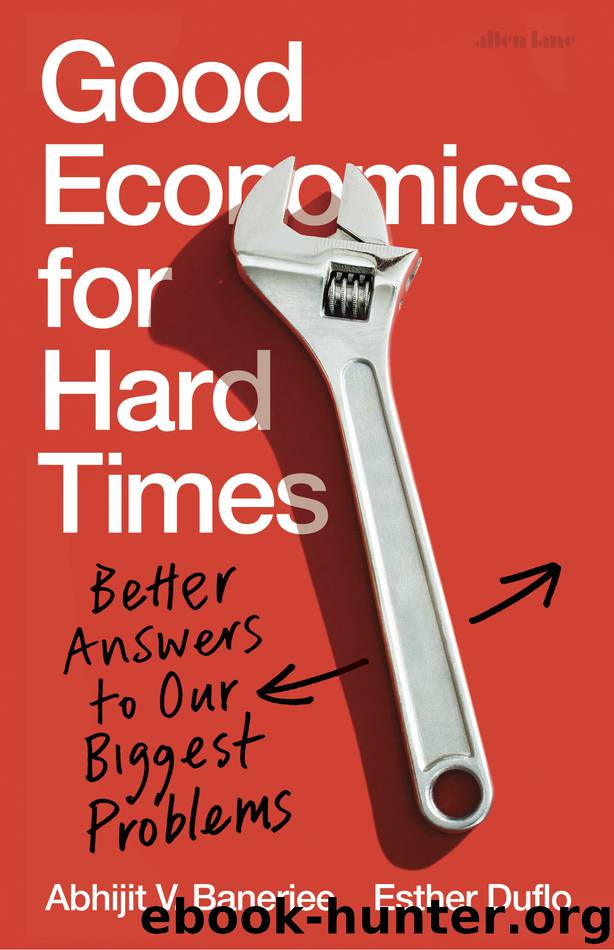Good Economics for Hard Times by Abhijit V. Banerjee

Author:Abhijit V. Banerjee
Language: eng
Format: epub
ISBN: 9780141986203
Publisher: Penguin Books Ltd
Published: 2019-10-14T16:00:00+00:00
CHASING THE GROWTH MIRAGE
If this is the right story, India should start to worry about what happens when those opportunities begin to run out. Unfortunately, just as we don’t know much about how to make growth happen, we know very little about why some countries get stuck but others don’t—why South Korea kept growing but Mexico did not—or how one gets out. One very real danger is that in trying to hold on to fast growth, India (and other countries facing sharply slowing growth) will veer toward policies that hurt the poor now in the name of future growth. The need to be “business friendly” to preserve growth may be interpreted, as it was in the US and UK in the Reagan-Thatcher era, as open season for all kinds of anti-poor, pro-rich policies (such as bailouts for overindebted corporations and wealthy individuals) that enrich the top earners at the cost of everyone else, and do nothing for growth.
If the US and UK experience is any guide, asking the poor to tighten their belts, in the hope that giveaways to the rich will eventually trickle down, does nothing for growth and even less for the poor. If anything, the explosion of inequality in an economy no longer growing has the risk of being very bad news for growth, because the political backlash leads to the election of populist leaders touting miracle solutions that rarely work and often lead to Venezuela-style disasters.
Interestingly, even the IMF, so long the bastion of growth-first orthodoxy, now recognizes that sacrificing the poor to promote growth was bad policy. It now requires its country teams to include inequality in factors to take into consideration when providing policy guidance to countries and outlining conditions under which they can receive IMF assistance.123
The key ultimately is to not lose sight of the fact that GDP is a means and not an end. A useful means, no doubt, especially when it creates jobs or raises wages or plumps the government budget so it can redistribute more. But the ultimate goal remains one of raising the quality of life of the average person, and especially the worst-off person. And quality of life means more than just consumption. As we saw in the previous chapter, most human beings care about feeling worthy and respected; they suffer when they feel they are failing themselves and their families. While better lives are indeed partly about being able to consume more, even very poor people also care about the health of their parents, about educating their children, about having their voices heard, and about being able to pursue their dreams. A higher GDP may be one way in which this can be given to the poor, but it is only one of the ways, and there is no presumption that it is always the best one. In fact, the quality of life varies enormously between middle-income countries. For example, Sri Lanka has more or less the same GDP per capita as Guatemala but maternal, infant, and child mortality are much lower in Sri Lanka (and are comparable with those in the United States).
Download
This site does not store any files on its server. We only index and link to content provided by other sites. Please contact the content providers to delete copyright contents if any and email us, we'll remove relevant links or contents immediately.
The Secret History by Donna Tartt(16673)
The Social Justice Warrior Handbook by Lisa De Pasquale(11495)
Thirteen Reasons Why by Jay Asher(7806)
This Is How You Lose Her by Junot Diaz(5802)
Weapons of Math Destruction by Cathy O'Neil(5050)
Zero to One by Peter Thiel(4839)
The Myth of the Strong Leader by Archie Brown(4796)
Promise Me, Dad by Joe Biden(4459)
Beartown by Fredrik Backman(4437)
Stone's Rules by Roger Stone(4426)
How Democracies Die by Steven Levitsky & Daniel Ziblatt(4422)
The Fire Next Time by James Baldwin(4353)
100 Deadly Skills by Clint Emerson(4089)
A Higher Loyalty: Truth, Lies, and Leadership by James Comey(4043)
Rise and Kill First by Ronen Bergman(4026)
The David Icke Guide to the Global Conspiracy (and how to end it) by David Icke(3898)
The Farm by Tom Rob Smith(3880)
Secrecy World by Jake Bernstein(3791)
The Doomsday Machine by Daniel Ellsberg(3741)
